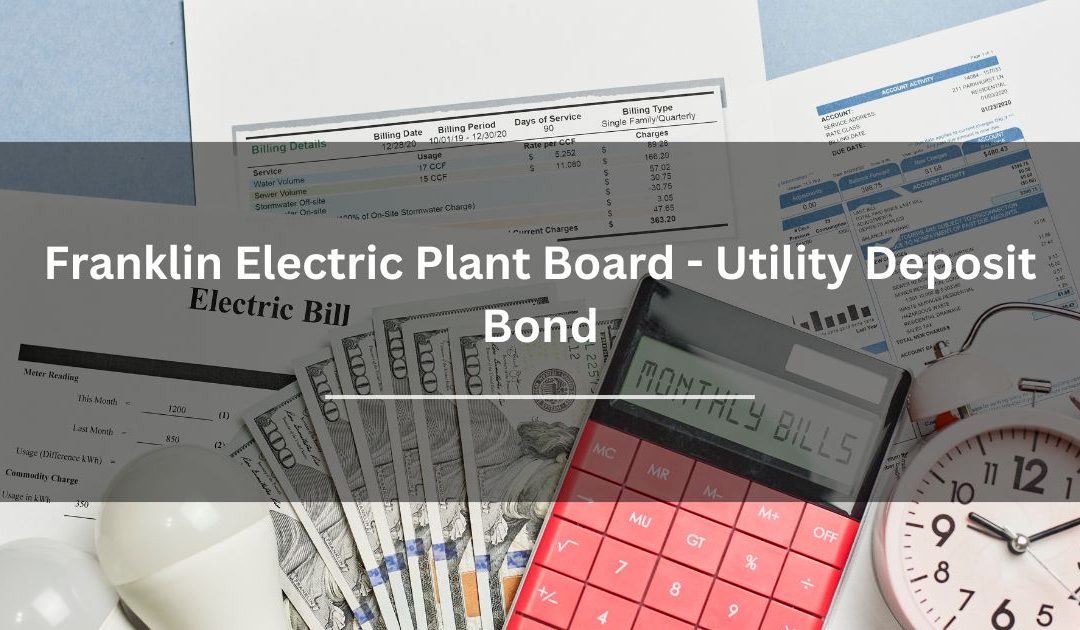Get an Instant Quote on Utility Deposit Bond
Introduction
From our perspective, business owners in Franklin, Kentucky, often face utility startup costs that can delay operations or stretch the budget. Whether you're opening a retail store, running a restaurant, or setting up a construction site, utility services like electricity are non-negotiable. To start service with the Franklin Electric Plant Board, some commercial accounts must post a large cash deposit to cover potential unpaid bills. Fortunately, there’s a better option: the Franklin Electric Plant Board - Utility Deposit Bond.
This bond serves as a financial guarantee to the utility provider that your business will pay its electric bills. Instead of tying up thousands of dollars in cash, this bond allows you to keep your working capital while still meeting the deposit requirement. It’s a smart, flexible solution that gives the utility board confidence and gives your business room to operate.
Utility deposit bonds are increasingly popular with startups and expanding companies that want to reduce upfront costs. For comparison, large-scale service industries like healthcare must meet higher bonding requirements, such as the Kentucky - Pharmacy Benefits Manager (PBM) ($1,000,000) Bond, but the purpose is similar—guarantee performance and payment. Understanding how the Utility Deposit Bond works can save you time, money, and operational stress.
Common Confusion About Utility Bonds
We’ve noticed that many business owners think this bond is the same as insurance or that it covers their equipment or building. It doesn’t. The Franklin Electric Plant Board - Utility Deposit Bond protects the utility company—not the customer. If your business doesn’t pay its electric bill, the bond can be used to recover those unpaid funds. The bond provider (the surety) then seeks reimbursement from your business.
There’s also a misunderstanding that this bond is optional. While not all customers are required to provide it, the Electric Plant Board may request it in place of a cash deposit, especially for new or high-usage accounts. Failing to provide a bond or deposit may lead to delayed service activation or denied service altogether.
We’ve also seen business owners confuse this bond with others in entirely different industries. For instance, the Kentucky - Business Opportunity ($75,000) Bond protects investors in business opportunity sales, and the Kentucky - Pharmacy Benefits Manager (PBM) ($1,000,000) Bond protects pharmacies and health plans. Utility deposit bonds are more localized and tied directly to your utility provider’s requirements.

How Swiftbonds Helps Utility Customers in Franklin
Based on our experience, Swiftbonds regularly helps businesses across Kentucky—including those in Franklin—secure utility deposit bonds quickly and affordably. When the Franklin Electric Plant Board requires a bond instead of a deposit, business owners often come to us unsure of how to meet that requirement.
We walk you through the entire process: from getting a quote to issuing the bond to making sure it meets the Plant Board’s exact wording and filing guidelines. Whether you're launching a new business or moving into a larger facility with higher energy usage, Swiftbonds ensures that your bond is accepted without hiccups.
Our background spans all sectors. Whether you're confused about this local utility bond or trying to understand high-level instruments like the Kentucky - Business Opportunity ($75,000) Bond or the Kentucky - Pharmacy Benefits Manager (PBM) ($1,000,000) Bond, we provide clear answers and fast solutions.

Steps to Secure the Utility Deposit Bond
What we’ve discovered is that securing the Franklin Electric Plant Board - Utility Deposit Bond is easier than most business owners expect when they follow this step-by-step approach:
-
Contact the Utility Board: Confirm whether your account requires a cash deposit or if you can provide a bond as an alternative.
-
Request the Bond Amount: The required bond value typically depends on projected usage or previous account history.
-
Apply Through Swiftbonds: Submit a simple application with your business details. Most bonds are quoted and approved in less than 24 hours.
-
Pay the Premium: Once approved, pay a small percentage of the bond amount—usually much lower than the cash deposit required.
-
File with the Franklin Electric Plant Board: Submit the bond document to activate your utility account.
We help with every step, from matching the Plant Board’s specifications to renewing the bond annually, if needed.

Why Timely Bonding Keeps Your Project On Schedule
We’ve found that waiting too long to secure your Franklin Electric Plant Board - Utility Deposit Bond can delay service activation. Utility delays can ripple through your entire project timeline—stalling renovations, inspections, or opening day.
If you're a contractor managing multiple vendors, the delay in receiving power could impact subcontractor availability or delivery schedules. In worst-case scenarios, failure to get bonded means you must tie up thousands in deposits, creating unnecessary strain on your cash flow.
This is similar to the licensing delays faced by those who don’t meet requirements for the Kentucky - Pharmacy Benefits Manager (PBM) ($1,000,000) Bond. While the stakes differ, the lesson is the same: the sooner you act, the smoother your project will go.

The Risk of Operating Without a Bond
In our observation, businesses that skip bonding or delay compliance with the Franklin Electric Plant Board - Utility Deposit Bond often face costly setbacks. If you try to start service without the bond or deposit, you could face disconnection notices or outright denial of electric service.
This affects more than just lights and HVAC—it can prevent fire alarm systems, refrigeration units, and essential machinery from working. Operating without utilities isn’t just inconvenient—it can be unsafe and a code violation.
Businesses in other sectors face the same risks when bonds are overlooked. Companies that don’t secure a Kentucky - Business Opportunity ($75,000) Bond can’t legally offer certain investment programs. Similarly, PBMs without the Kentucky - Pharmacy Benefits Manager (PBM) ($1,000,000) Bond are prohibited from operating in Kentucky. Utility bonding, though smaller in scale, is just as critical for your business’s credibility and function.
Kentucky Construction Law And Performance Bond Compliance
Though utility deposit bonds are separate from construction performance bonds, they share a similar foundation under Kentucky law: financial accountability. The Kentucky Little Miller Act (KRS § 45A.190) requires performance and payment bonds on public construction contracts over $40,000 to protect the public from contractor default.
Just as public owners need protection on construction jobs, utility providers need assurance that commercial customers will meet their obligations. Bonds provide that security.
To review the statutes related to public bonds, visit the Kentucky Legislature’s official site. The Franklin Electric Plant Board sets its own bonding guidelines for deposits, but the principles align with state practices on risk reduction and compliance.
Conclusion
We’ve come to appreciate that the Franklin Electric Plant Board - Utility Deposit Bond offers a flexible, business-friendly way to meet utility requirements without sacrificing your working capital. It’s more than a license formality—it’s a smart move for any business looking to reduce costs and streamline operations.
Swiftbonds helps businesses across Kentucky—from local shops to large operations—get bonded quickly, accurately, and affordably. Whether you’re navigating this local utility bond or more complex instruments like the Kentucky - Business Opportunity ($75,000) Bond or the Kentucky - Pharmacy Benefits Manager (PBM) ($1,000,000) Bond, Swiftbonds is your partner in getting it right the first time.
Don’t let deposits tie up your cash flow. Let Swiftbonds help you keep your utility services running and your business moving forward.
Frequently Asked Questions
What does the Franklin Electric Plant Board - Utility Deposit Bond cover?
We’ve often noticed confusion about this bond’s purpose. It guarantees payment of electric bills to the Franklin Electric Plant Board if a business customer defaults on their account.
Who needs a Utility Deposit Bond in Franklin, KY?
We’ve often noticed business owners unsure about eligibility. The Franklin Electric Plant Board may require this bond for new or high-usage commercial customers as a replacement for a cash deposit.
How much does this bond cost?
We’ve often noticed pricing concerns. The bond premium is usually a small percentage of the total bond amount and is often far less than the cash deposit otherwise required.
Is this bond the same as a performance bond for construction?
We’ve often noticed confusion between bond types. No. This bond covers utility payments. Construction projects use separate performance bonds regulated under Kentucky law.
Can I use this bond in place of other types, like the Kentucky - Business Opportunity ($75,000) Bond?
We’ve often noticed mix-ups here. No. This bond is only valid for meeting the Franklin Electric Plant Board’s deposit requirements. It does not substitute for licensing or compliance bonds in other industries.


